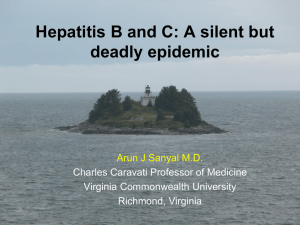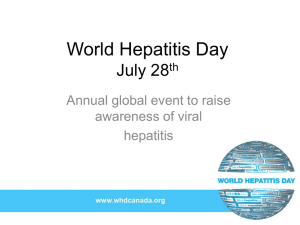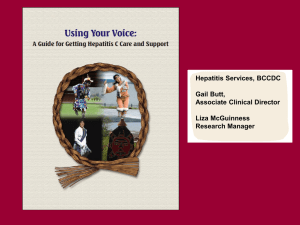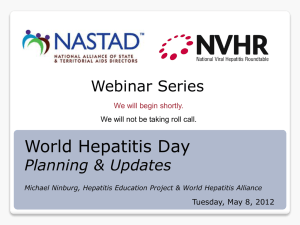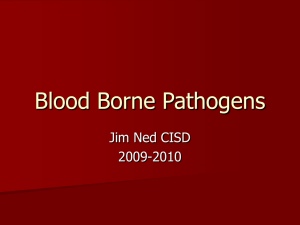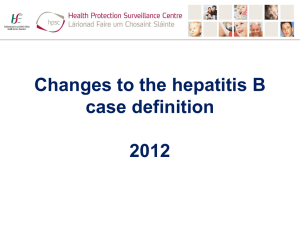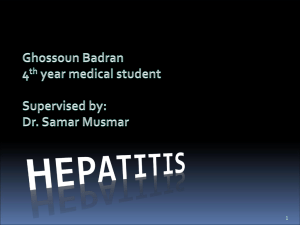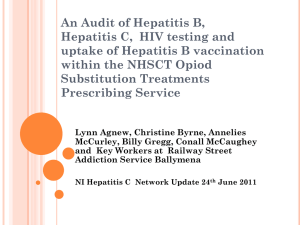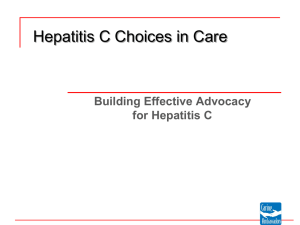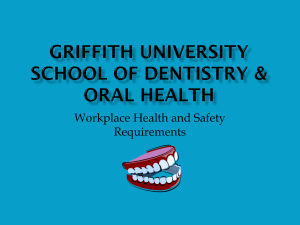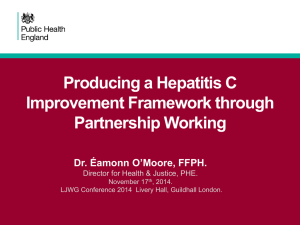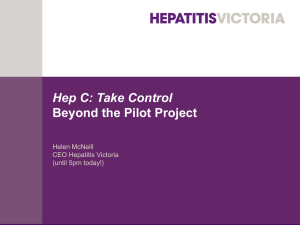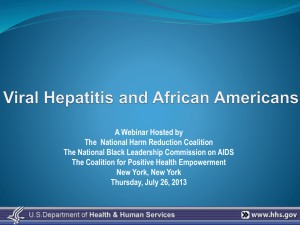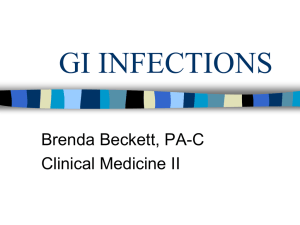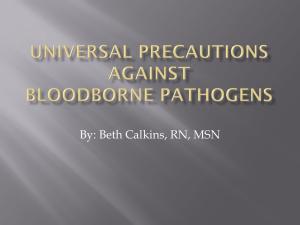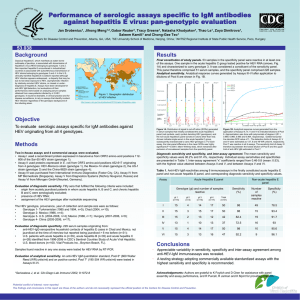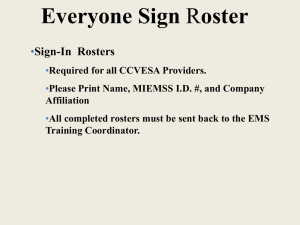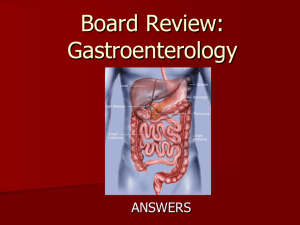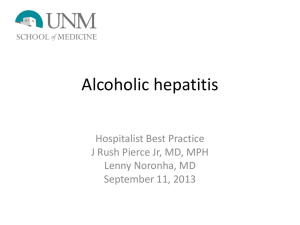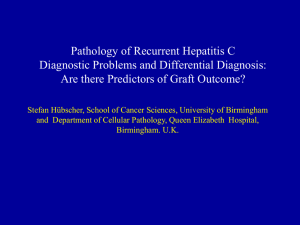New treatments workshop LJWG 2014
advertisement
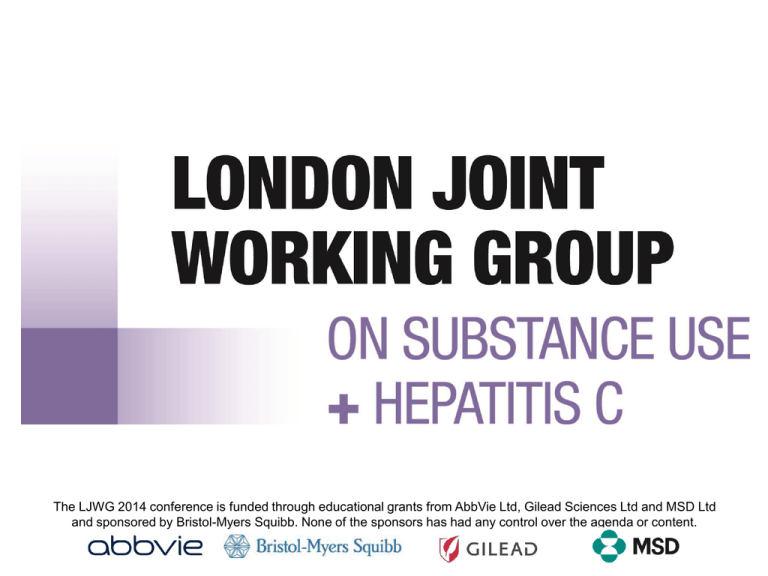
The LJWG 2014 conference is funded through educational grants from AbbVie Ltd, Gilead Sciences Ltd and MSD Ltd and sponsored by Bristol-Myers Squibb. None of the sponsors has had any control over the agenda or content. Hepatitis C in London: practical steps to elimination Monday 17th November 2014 Guildhall, London Hepatitis C in London: practical steps to elimination Co-Chairs: Cllr Victoria Borwick Deputy Mayor of London Dr Ashley Brown Consultant Hepatologist, St. Mary’s and Hammersmith Hospitals London and Honorary Senior Lecturer, Imperial College London #LJWG2014 SESSION 1 Tools to eliminate Tackling Hepatitis what PHE modelling shows us Dr Helen Harris Clinical Scientist & Research Associate, Public Health England Data collection and barriers in the system Dee Cunniffe Policy Lead & Co-facilitator London Joint Working Group on Substance Use and Hepatitis C How aspirations can be built and levels of performance can be assured: learning from the Scottish Action Plan Professor Sharon Hutchinson Professor of Epidemiology & Population Health Glasgow Caledonian University Health Protection Scotland Needle exchange impact on hepatitis C pathways Mike Burns CEO & Operations Director CAIR Scotland Supporting people who use drugs and providers: Hep C info and care Dr Magdalena Harris Qualitative Sociologist London School of Hygiene & Tropical Medicine The role of technology in supporting patient pathways Claire Munro Co-facilitator London Joint Working Group on Substance Use and Hepatitis C RCGP training online: new training in short bites Danny Morris RCGP Clinical Lead Hepatitis B & C, Part 1 certificate Hepatitis C in London: practical steps to elimination QUESTIONS Dr Ashley Brown Consultant Hepatologist, St. Mary’s and Hammersmith Hospitals, London and Honorary Senior Lecturer, Imperial College London Hepatitis C in London: practical steps to elimination REFRESHMENT BREAK SESSION 2 Collaborate to eliminate Producing a framework for hepatitis C through partnership working Dr Éamonn O’Moore Head of Health & Justice Health & Wellbeing Directorate Public Health England The role of drug treatment providers in the care pathway: practical learning from the South-West David Badcock Head of Recovery Engagement Addaction Reducing transmission in PWID by scaling up drug treatment, OST and needle exchange services Professor Matt Hickman Professor of Public Health & Epidemiology University of Bristol The Updated LJWG Consensus Dr Ashley Brown Consultant Hepatologist, St. Mary’s and Hammersmith Hospitals, London and Honorary Senior Lecturer, Imperial College London Hepatitis C in London: practical steps to elimination QUESTIONS Cllr Victoria Borwick Deputy Mayor of London WORKSHOPS Hepatitis C policy development - East Crypt (adjacent to Livery Hall) How to reduce blockages in the system by implementing care pathways in collaboration with commissioners - West Crypt (walk through the East Crypt) The impact of new drug treatments on elimination - Livery Hall (main plenary) Community mobilisation: engaging users to support needle exchanges and peer-led groups - City Marketing Suite Conference Room (outside and right) Hepatitis C in London: practical steps to elimination LUNCH The LJWG 2014 conference is funded through educational grants from AbbVie Ltd, Gilead Sciences Ltd and MSD Ltd and sponsored by Bristol-Myers Squibb. None of the sponsors has had any control over the agenda or content. Hepatitis C in London: practical steps to elimination WORKSHOP FEEDBACK Chair: Charles Gore President, World Hepatitis Alliance Chief Executive, Hepatitis C Trust The impact of new drugs on elimination Dr Suman Verma Institute of Liver Studies King's College Hospital London New Drugs for HCV - key messages • A tornado of new drugs • Combinations of drugs together work best • Less role of interferon • 8-12 weeks duration • Real life is not as per the trials • Access & affordability • The future is bright but the timelines unclear… Hepatitis C policy development Chris Kelly Assistant Head of Health & Justice Commissioning NHS England Hepatitis C policy development Solutions to policy challenges Chris Kelly, NHS England 1. Low public and GP awareness – education programmes, campaigns, training 2. Policy deprioritisation – overarching policy initiatives eg Health Check, Outcomes Framework 3. Inflexible services/time pressures – care navigators, community prescribing, digital access to information 4. Opaque commissioning – clearer guidance, ensuring strategies in place for longer than duration of tenders, focusing on service delivery and integration How to reduce blockages in the system by implementing care pathways in collaboration with commissioners Emma Burke Alcohol & Drugs Programme Manager Public Health England Reducing blockages in the pathway Blockages: • Lack of understanding commissioning & where the funding comes from • No recourse to public funds • Treatment too difficult to access • Tension between local and national priorities • Short-term planning and commissioning • Skills and education all along the pathway (staff and service users, commissioners) Solutions: • Clarify role of CCGs, NHSE & Local Authorities, and funding for new treatments • London-wide Commissioning and pathways • Deliver treatment ‘near the service user’ / in the community / possibly by pharmacist • Need a national driver and long-term plans • Education and formal training • Build Peer-support and user voice Community mobilisation: engaging users to support needle exchanges and peer-led groups Mat Southwell Partner Coact Community Mobilisation Engaging people who use drugs to support needle exchanges & peer led groups •Mat Southwell •Partner Coact www.co-act.info Community mobilisation NSPs • Peer led NSPs • Meaningful participation in traditional NSPs • Secondary needle exchange • Supplier engagement matsouthwell@co-act.info Final panel • Mike Burns CEO & Operations Director, CAIR Scotland • Jim Conneely Hepatitis C Patient and Hepatitis C Trust outreach worker • Professor Graham Foster Professor of Hepatology and Consultant Hepatologist, Bart’s and The Royal London Hospitals, London • Professor Matt Hickman Professor of Public Health and Epidemiology, University of Bristol • Peter Kohn Director, London Office of Clinical Commissioning Groups • Dr Éamonn O’Moore Head of Health & Justice, Health & Wellbeing Directorate, Public Health England • Dr Sally Porter Consultant in Addiction Psychiatry, South London and Maudsley NHS Foundation Trust, and Turning Point The LJWG 2014 conference is funded through educational grants from AbbVie Ltd, Gilead Sciences Ltd and MSD Ltd and sponsored by Bristol-Myers Squibb. None of the sponsors has had any control over the agenda or content.
